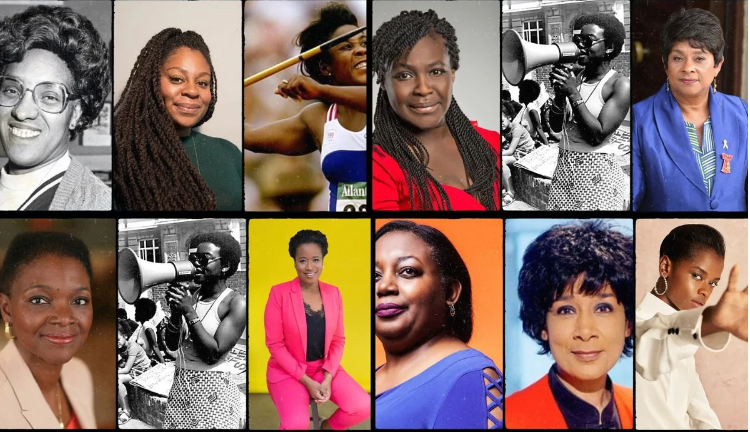
BHM: Female Black British Pioneers Pt.1
Share
The theme for Black History Month 2024 is "Reclaiming Narratives." It's an open invitation to everyone in the Black community to take charge of how our stories are told.
This is about making sure our voices resonate, our lived experiences are recognized, and our contributions are honoured. For too long, our stories have been told by others, resulting in incomplete and distorted representations that don't fully reflect the richness of our experiences.
The aim is to bring to light the stories that have gone untold, celebrate the unrecognized figures, and uplift the everyday individuals who have left a lasting mark on our communities.
This is your moment to be part of a larger movement. "Reclaiming Narratives" is your chance to contribute to the collective reimagining of Black history. By joining in, you’ll help future generations grow up with a fuller, more truthful understanding of our past and its ongoing impact.
|
|
Betty Campbell was born in Cardiff 1934. At school, Betty was top of her class and wanted to be a teacher from a young age. She faced discouragement from a teacher who told her the problems would be ‘insurmountable’ but she was determined. In 1960 upon discovering that the Cardiff Teacher Training College were enrolling female students, Campbell applied and was one of only six female students to be admitted. After training, Betty began teaching in Llanrumney, but then returned to Butetown, to Mount Stuart Primary School. She was to teach there for 28 years. When she became Wales' first black head teacher at Mount Stuart in the 1970s, she began teaching children about slavery, black history and the system of apartheid which operated at the time in South Africa. She made Mount Stuart Primary School a model for multi-cultural education in Britain. Betty Campbell was one of the creators of Black History Month. She became a member of the Commission for Racial Equality, meeting Nelson Mandela on his visit to Wales in 1988. She was appointed MBE in 2003 for services to education and community life. In 2015, she received a lifetime achievement award from Unison Cymru's Black Members' group, for her contribution to black history and Welsh education. A statue of Betty Campbell sits outside the BBC Headquarters in Cardiff, as part of the "Hidden Heroines" campaign. It is Cardiff's first statue of a named woman. |
|
|
𝗕𝗮𝗿𝗼𝗻𝗲𝘀𝘀 𝗗𝗼𝗿𝗲𝗲𝗻 𝗟𝗮𝘄𝗿𝗲𝗻𝗰𝗲 grew up in Jamaica and at age nine travelled to England, South London. Later in life, Doreen attended university where she pursued a BA Hons in Humanities. It was during this time in 1993 that Doreen’s son Stephen was tragically murdered, an incident that changed the course of her life and led to her to becoming a seminal figure in the struggle for racial justice and advancement of social policy in modern Britain. Doreen’s campaigning led to the creation of the Macpherson Report, a public inquiry in 1999 that prompted necessary reforms of the UK police service. She has also set up the Stephen Lawrence Charitable Trust to develop community programmes in South London. In 2013, she was awarded an OBE for services to community relations and made a Labour life peer. Baroness Doreen Lawrence often lends her voice, time and insight to advancing causes around equality across the UK. |
|
|
𝗥𝗲𝗻𝗶 𝗘𝗱𝗱𝗼-𝗟𝗼𝗱𝗴𝗲 is an award-winning British author and journalist, whose work primarily focuses on exposing structural racism. She studied English literature at University of Central Lancashire, graduating in 2011. While at university, she became involved in feminist activism and the 2010 student protest movement. She has appeared on various discussion panels from BBC Radios Woman's Hour, Night Waves, and as a judge in the BBC Woman's Hour Power List 2014. In 2017, Eddo-Lodge completed her debut book 𝗪𝗵𝘆 𝗜'𝗺 𝗡𝗼 𝗟𝗼𝗻𝗴𝗲𝗿 𝗧𝗮𝗹𝗸𝗶𝗻𝗴 𝘁𝗼 𝗪𝗵𝗶𝘁𝗲 𝗣𝗲𝗼𝗽𝗹𝗲 𝗔𝗯𝗼𝘂𝘁 𝗥𝗮𝗰𝗲 which won the Jhalak Prize in 2018. Reni also has a podcast called About Race with Reni Eddo-Lodge which was named one of the best podcasts of 2018 by British GQ and Wired. Seen as a complement to the book, the podcast examined Britain's modern relationship with race. In January 2018, Eddo-Lodge was chosen as one of seven prominent British women to be photographed for British Vogue, to mark the centenary of “British women winning the right to vote” In the 2020 and 2021 editions of the Powerlist, Eddo-Lodge was listed in the Top 100 of the most influential people in the UK of African/African-Caribbean descent. |
|
|
𝗖𝗵𝗮𝗿𝗹𝗲𝗻𝗲 𝗗𝗲𝗻𝗶𝘀𝗲 𝗪𝗵𝗶𝘁𝗲 is a British television broadcaster, journalist and presenter. Born in London, to Jamaican parents, she graduated from the London College of Printing and went on to become the youngest senior journalist at the BBC aged twenty-two. In 2008, she joined ITN, as a newscaster for the ITV News at 5:30. In April 2014, White became the first black woman to present ITV News at Ten and was an occasional relief presenter until October 2015. She also occasionally presented the ITV Weekend News until 2019. On August 2020, White made her debut as a guest presenter of Loose Women. She returned on January 2021, where it was announced she was to become a regular presenter on the show. In the 2020 and 2021 editions of the Powerlist, White was listed in the Top 100 of the most influential people in the UK of African/African-Caribbean descent. |
|
|
𝗖𝗮𝗻𝗱𝗶𝗰𝗲 𝗖𝗮𝗿𝘁𝘆-𝗪𝗶𝗹𝗹𝗶𝗮𝗺𝘀 was born and raised in South London to parents of Jamaican- Indian heritage. She studied for a degree in communication and media studies at the University of Sussex, after which she decided to try to enter the publishing industry. Writer of the unforgettable 𝗤𝘂𝗲𝗲𝗻𝗶𝗲, Candice was the 𝗳𝗶𝗿𝘀𝘁 𝗕𝗹𝗮𝗰𝗸 𝘄𝗼𝗺𝗮𝗻 𝘁𝗼 𝘄𝗶𝗻 𝗕𝗼𝗼𝗸 𝗼𝗳 𝘁𝗵𝗲 𝘆𝗲𝗮𝗿 𝗮𝘁 𝘁𝗵𝗲 𝗕𝗿𝗶𝘁𝗶𝘀𝗵 𝗯𝗼𝗼𝗸 𝗮𝘄𝗮𝗿𝗱𝘀 in June 2020. Before writing her first novel she worked in publishing, it was during this time she became aware of the underrepresentation of BAME authors and writers in publishing. So she took action and created the Guardian and 4th Estate BAME Short Story Prize, to improve the diversity of the publishing world. Queenie received much positive critical attention, described by reviewers as both a "smart and breezy comic debut" and "astutely political, an essential commentary on everyday racism." Queenie was adapted into an eight-episode television drama for Channel 4 and Hulu. People Person, Carty-Williams' second novel, was published in April 2022 |





